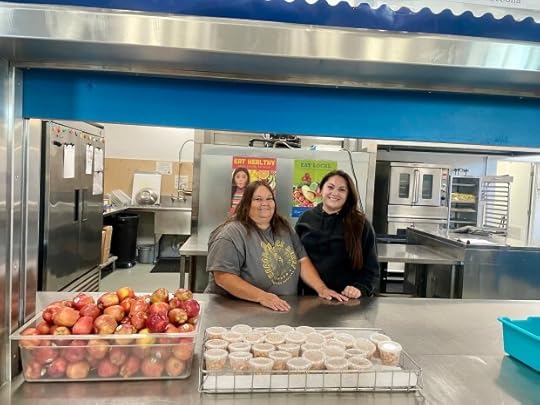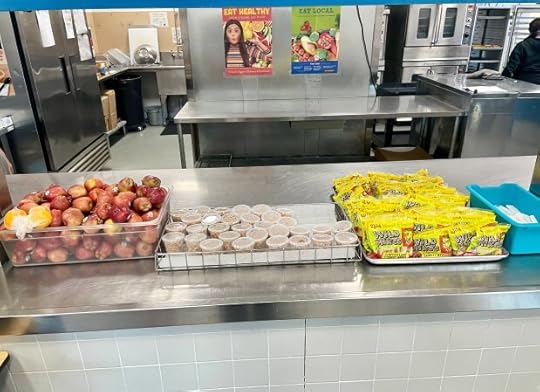Students reliant on school lunches are set for the summer
Schools are out of session for the summer but many students still have access to nutritious meals through various free summer meal programs throughout the county.
Two of these programs are provided by the Alisal Union and Monterey Peninsula Unified School Districts. Through July, students and children under the age of 18 are able to stop by designated sites to receive free breakfast, lunch, snacks and supper.
“For a lot of students, oftentimes school meals are the only place they’re receiving meals during the day. Being able to continue that into the summer is extremely important,” said Micha James, director of nutrition services at Monterey Peninsula Unified.
For the Monterey Peninsula Unified program, there are nine sites throughout Marina and Seaside, including the Dual Language Academy of the Monterey Peninsula, the Marina City Library and Seaside High School.
A nutritious meal during the school day “allows (students) to focus and concentrate and it allows them to be present and get the most out of the education they are there to get,” said James.
In terms of knowing what constitutes a balanced meal, “you often hear about eating the rainbow,” said James. She recommends focusing on “a blend of everything,” including grains, meat or meat alternatives, vegetables, fruits and starches.
The majority of sites designated for this program are schools. According to Monterey Peninsula Unified Superintendent PK Diffenbaugh, the reason for this is simply because the community often feels safest at its schools.
 Mother-daughter duo Joanne and Amanda Olivio volunteer their kitchen services for the summer academy program at the Dual Language Academy of the Monterey Peninsula. (Andrea Valadez – Monterey Herald)
Mother-daughter duo Joanne and Amanda Olivio volunteer their kitchen services for the summer academy program at the Dual Language Academy of the Monterey Peninsula. (Andrea Valadez – Monterey Herald)“School has become the institution they trust the most. That’s why when we did COVID-19 vaccines, we did it at the school site, because families have come to trust institutions of school more than they might other institutions in the community,” said Diffenbaugh.
These programs are “all about service and making sure that all of our young people and families we serve have their needs met both during the year and summer months as well,” said Monterey County Schools Superintendent Deneen Guss.
“It could be that this is the only secure meal that a young person receives during the summer months. This is always an issue, it was an issue prior and post COVID-19, that a lot of families are struggling to put food on the table,” said Guss.
For the high percentage of students in the county who qualify for free and reduced lunches, “they need a consistent, safe and organized place where they can count on ‘if I go to school, this is what I’m going to get,’” said Diffenbaugh.
Alisal Union has a similar program, giving out free meals at 11 different sites this summer. School sites include Virginia Rocca Barton School and Cesar E. Chavez Elementary School. City Parks and Recreation is also participating, with some sites being First Tee of Monterey and the Cesar Chavez Library, according to Alisal Union Nutrition Services Director Irene Vargas.
Some of the meals served at Alisal’s sites include homemade spaghetti, chicken sandwiches and even homemade birria, according to Vargas. An important aspect of these programs is to give students nutritious, but appetizing meal options that they will enjoy eating.
For James, if students want chicken nuggets, they can have them, just with cleaner ingredients.
 Students are given a variety of snack and lunch options, including apple slices. (Andrea Valadez – Monterey Herald)
Students are given a variety of snack and lunch options, including apple slices. (Andrea Valadez – Monterey Herald)The focus of the nutrition services department is on clean and whole foods and not serving items that include ingredients like high fructose corn syrup or sweeteners that “research has pointed to being detrimental to a growing body,” said James. It’s important not to serve foods whose ingredient lists look like a “chemistry project,” she said.
James said a good rule of thumb for knowing if an item is worth purchasing is “if you can’t pick up everything on an ingredient list in a grocery store, don’t put it in your basket.”
Through summer meal programs, the sites are able to provide “security and mindfulness to students when they know they’re going to get a nutritious meal,” said Vargas. These programs also create a sense of relief for parents who may not have the resources to provide a balanced meal three times a day.
“We have so many families struggling right now, especially with inflation. These programs really meet that need for nutrition security,” said Guss. “We have a lot of communities that rely on local food banks, but they alone cannot meet the need. So it takes all of these various entities that can provide healthy food to our communities.”
For Diffenbaugh, given the many kids who rely on school as a place for guaranteed meals, “pulling the rug out from under them during summer is not acceptable.”
The full list of sites and times to come in can be found at https://www.mpusd.net/apps/news/article/1936294 and https://www.alisal.org/site/default.aspx?PageType=3&DomainID=4&ModuleInstanceID=22&ViewID=6446EE88-D30C-497E-9316-3F8874B3E108&RenderLoc=0&FlexDataID=3639&PageID=1.



